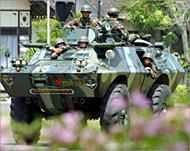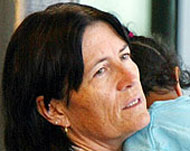Indonesian military implicated in murder
Two American teachers were murdered in remote West Papua province two years ago with the full knowledge and cooperation of the Indonesian military, a respected human rights campaigner says.

John Rumbiak, the exiled Papuan chairman of the Institute for Human Rights Study and Advocacy (ELSHAM), said on Tuesday the confessed triggerman in the case, 32-year-old Anthonius Wamang, told FBI investigators that Indonesian soldiers provided him with the weapons and ammunition used in the August 2002 ambush.
“We base our facts on the investigation done by the FBI, which we assisted,” Rumbiak said on Tuesday from Canberra, Australia.
“He (Wamang) told the FBI that he got the ammunition and weapons from the military, from the army, and not from the OPM (rebel Free Papua Movement). The officers there knew exactly who Anthon was, and that he planned to carry out an attack at Freeport.”
Two American teachers and an Indonesian companion were killed and nine others injured, including a six-year-old child, when their convoy was riddled with almost 150 bullets as they drove along a heavily guarded road inside the sprawling US-owned Freeport-McMoRan Copper and Gold mine on 31 August 2002.
On Tuesday night, an Australian television programme broadcast an interview with a man Rumbiak identified as Wamang. The man says he and a group of men opened fire on the convoy believing the vehicles carried Indonesian soldiers. He claimed his group was angry at army excesses and the environmental destruction the mine had caused.
US justice
In June, a US Grand Jury indicted Wamang “and others known and unknown” for the killings under a clause in the criminal code that allows for charges to be laid in a US court for crimes committed against its citizens abroad.
FBI director Robert Mueller hailed the assistance of Indonesian authorities as a model in counter-terrorism cooperation.
“The US government is committed to tracking down and prosecuting terrorists who prey on innocent Americans in Indonesia and around the world,” Attorney General John Ashcroft said at the time.
“Terrorists will find they cannot hide from US justice – whether in the world’s largest cities or in the most remote jungles in Asia.”
Military relations
However, Rumbiak and others believe the George Bush’s administration is attempting to provide the Indonesian Armed Forces (TNI) with cover because it wants to renew direct military training between the two countries.
 |
|
The US wishes to rebuild links |
The training agreements were suspended in 1991 after evidence emerged of TNI atrocities committed against civilians in East Timor, then a province of Indonesia.
“I believe the military is behind this case but the US is so desperate to reinstate military training that they’re going to make the focus of this whole incident towards individuals instead of trying to establish command responsibility,” said Rumbiak, who is touted by some as a future Nobel Peace prize nominee.
“They are trying to sever the relationship between the individuals involved and the TNI as an institution.”
Big business
The army has been accused of committing widespread human rights abuses against the population of West Papua province since Indonesia acquired the former Dutch colonial property in a contentious UN-supported ballot known as the Act of Free Choice in 1969.
 |
|
US national Saundra Hopkins |
The OPM, a fractured and poorly armed organisation, emerged to spearhead the fight for independence. Wamang conducted exercises with the OPM in the past, the local commander Kelly Kwak told ELSHAM investigators, but in recent years also developed business interests with TNI officers.
Freeport was among the very first foreign companies to invest there and today operates the largest, most profitable gold mine on the planet. It is Papua’s largest employer and the largest taxpayer in Indonesia, having remitted roughly $3bn during the past decade.
The TNI enjoys a lucrative security contract ($11m between 2000 and 2002) at the mine, whose Louisiana-based operators too have been accused of numerous human rights and environmental excesses.
Freeport refuses to talk about the security contract but in a 2003 filing to the Securities and Exchange Commission the company revealed it paid the Indonesian military $5.6m in 2002 and $4.7m in 2001 for security services.
Army role
A month prior to the ambush, Freeport decided to drop the security arrangement with the TNI. The initial police investigation concluded this was the motivation behind the attack and that, “there is a strong possibility that the … case was perpetrated by the member(s) of the Indonesian National Army…”
That investigation was lead by the same highly respected Indonesian police officer who headed the successful inquiry and subsequent prosecution of dozens of al-Qaida-affiliated militants responsible for the bombing of two Bali nightclubs that claimed the lives of more than 200 people.
It focuses on the presence in the area of the ambush of a carload of members of the feared US- and Australia-trained army special forces group known as Kopassus.
Eluay murder
The group’s long history of conducting black operations against Papuan public figures culminated with the murder of high-profile independence leader Theys Eluay in November 2001.
Indonesia’s army chief of staff described as “heroes” the group of junior officers who were subsequently sentenced to jail terms of less than three years for Eluay’s murder.
|
“The US must not accept a typical TNI scapegoat solution involving low-ranking rogue TNI culprits as that would amount to conspiring in the cover-up” Ed McWilliams, |
The TNI has cleared its members of any involvement in the Freeport killings. While agreeing publicly to assist an FBI investigation into the murders, Indonesian security officials on the ground refused to allow soldiers to be interviewed. Only on the third visit was the four-man Singapore-based team allowed to meet many of the principals.
Neither State Department nor Indonesian government officials were prepared to comment.
“The US must not accept a typical TNI scapegoat solution involving low-ranking rogue TNI culprits as that would amount to conspiring in the cover-up,” said Ed McWilliams a retired veteran State Department intelligence officer who worked for three years (1996-1999) as a political officer at the US embassy in Jakarta.
“The US has so conspired in other TNI cover-ups but never before in the case of the murder of US citizens.”